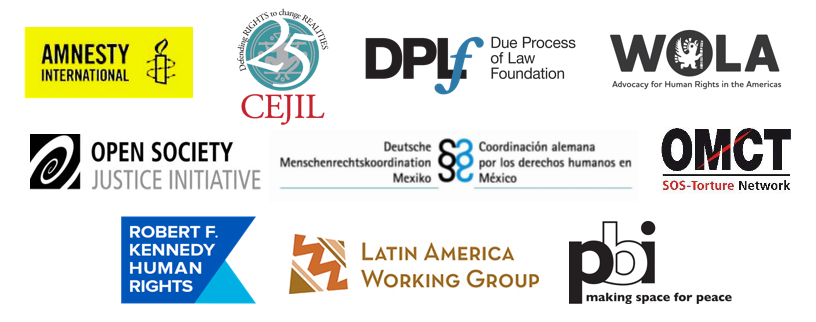Washington, D.C. / New York City / Stuttgart / Geneva, March 20, 2018 - The International Observatory on Human Rights in Mexico remains deeply concerned about the new Internal Security Law and the Mexican Government’s refusal to accept the Law’s implications. The International Observatory urges the Inter-American Commission on Human Rights (IACHR) to utilize all mechanisms at its disposal to prevent the militarization of public security in Mexico. In particular, the Observatory encourages the IACHR to lend its expertise to the Mexican Supreme Court as it reviews the proposed Law, and that it seek an advisory opinion from the Inter-American Court of Human Rights on the matter, as well.
Enacted on December 21st, 2017, the Internal Security Law gives broad and superseding authority to the Mexican military to engage in domestic law enforcement, including criminal investigative powers, but does not include specific measures for accountability or civilian oversight of military operations.
Members of the International Observatory, which includes 10 international human rights and justice groups, have warned that the Law could only add to the current climate of impunity in Mexico, given the Mexican military’s repeated failure to hold its personnel accountable for gross human rights violations, including forced disappearances, torture and extra-judicial killings.
Indeed, only last week the UN High Commissioner for Human Rights concluded that, in the investigation into the disappearance of 43 students from Ayotzinapa in 2014, “there are strong grounds to believe” that some of the people apprehended and accused in the case were arbitrarily detained and tortured by federal officials. It further highlights “an almost uniform modus operandi” of arbitrarily detaining and torturing people to extract information or confessions, and of significant delays in bringing them before a public prosecutor.
On March 2nd, the IACHR held a hearing during its recent session in Bogota, Colombia, and included testimony from Mexican human rights defenders and responses from representatives of Mexico’s government. Prior to the Law’s passage, the IACHR had expressed its concern about the human rights risks posed by the Law and warned that it includes provisions that are contrary to international human rights standards. In fact, the IACHR urged Mexico to “develop a concrete plan for the gradual withdrawal of the Armed Forces from public security tasks and for the recovery of such tasks by the civilian police force,” while strengthening the capacity of the police to carry out public security tasks.
These concerns were restated by a number of commissioners during the hearing. They expressed concern that the armed forces not only lack the appropriate training to deal with citizen security, but that the Law also threatens other core rights, including the right to protest and the right to access information.
The members of the International Observatory welcomed the IACHR’s continued interest in this issue, but were disappointed by the response of the Mexican government, which included:
1. Arguing that the Law was justified because civilian law enforcement agencies had been compromised by ties to criminal gangs in several cases. This claim ignores other factors, including the fact that the deployment of the armed forces has increased violence in parts of the country and that soldiers and marines frequently commit human rights abuses with impunity, or the fact that the armed forces are far from immune of being influenced by organized crime.
2. Citing examples of troops being deployed in counter-terrorism operations in several European countries. This claim again ignores the armed forces’ dismal record of involvement in abuse and the government’s failure to hold those responsible to account.
On March 13th, the IACHR expressed "deep concern" over the presidential decree that authorizes a federal intervention regarding matters of public order in the state of Rio de Janeiro, Brazil, as it grants extensive powers to the armed forces to restore order and places the police forces under the command of an Army general. The similarities with the Mexican case are evident and we expect a reaction just as strong.
The International Observatory on Human Rights in Mexico was established in December 2017 by 10 international human rights and justice groups to monitor the country’s human rights situation and to support national civil society partners in the face of growing threats.
The International Observatory’s inaugural members include: Amnesty International, the Center for Justice and International Law, the Due Process of Law Foundation, the German Network for Human Rights in Mexico, Latin America Working Group, Peace Brigades International, Robert F. Kennedy Human Rights, Washington Office on Latin America, the Open Society Justice Initiative and the World Organisation Against Torture.
See the complete statement here.






